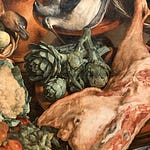I hope everyone is having a great winter. Before I start today’s essay, I’d like to offer, by way of a Christmas gift, a special offer — 20% off a paid subscription to my weekly newsletter. I send out a newsletter each week to my subscribers’ inboxes, with personal essays and podcasts on topics from gay pride to the political history of spiritualism, from notes scribbled in found books to story-telling, from sex to more sex. Your subscriptions help me pay the rent as a writer, and allow me to put out essays that could never find a home in mainstream newspapers and magazines. Also makes a great Christmas gift for hard-to-shop-for gay nerds.

Mussolini harvesting wheat
I understand why Italians get so mad at other countries interpreting their cuisine, really I do. Cooking hits close to home, it’s tied in with so many valuable and important memories, and food is, of course, deeply political. When Italians see their food, developed and protected so carefully over the centuries, corrupted or adulterated with other culinary traditions — be it marinara sauce or pineapple on pizza — it hurts them, deeply and sincerely. That doesn’t mean, however, that it isn’t very, very funny.
For a good while one of my favourite twitter accounts was @ItalianComments, also known as italians mad at food, which just posted screenshots of comments by Italians on (usually American) cookery videos. “Those videos are painful to watch, some people cry in silence, others let their rage out,” one user responds, “It’s like seeing someone you love being beaten up very badly… It’s hard to explain.” Another comment reads “OK, if you like to eat shit, enjoy… typical American behaviour… enjoy it, but this is not about tradition, is really that there are a lot of things mistaken in the recipe, but anyway, feel free to eat all the shit you are used too…”
There are some things that the italians mad at food are absolutely right about. I didn’t know how to cook pasta until I was in my mid-twenties, when I dated an Italian; the water needs a lot of salt, and no oil, and should be on a rolling boil before the pasta gets near it. And slop a good dash of it into your sauce at the end of cooking, while you’re at it. But there’s also a strange obsession amongst the commenters too, that Italians somehow have a preternatural understanding of food, and especially pasta, that goes beyond culture, that is passed down in the mother’s milk, that is part of what it is to be Italian. What’s more, that this knowledge is sacred and cannot be questioned… Ironically, this means many angry responses get it wrong. A good ragu does use carrots and celery, and Fettuccine Alfredo is an Italian dish, developed in Rome in the late 19th century. I just don’t care much for the attitude. Of course, on the one hand, they’re right; food is culture, not just sustenance. But there’s ways of addressing that. There’s something very loving about helping people cook, and about learning to cook. There’s something unspeakably shitty about shaming others’ cooking, and something unspeakably shitty about nationalism, too.
Here’s another comment from the page: “Making italian food wrogly (sic) is an offense against God’s chosen people, the italians.” Well thanks for that, username “@Fascistball_IV”. I know some who would disagree with you — Italian fascists for one. In fact Marinetti, the futurist poet and artist who was one of the creative and political pioneers behind fascist ideology, was a steadfast opponent of traditional Italian food. Within Marinetti’s philosophy were the initial aesthetic responses to an industrialising society of mass workers that would go on to shape fascism — an obsession with war as a purifying endeavour, “the world’s only hygiene”, with the speed and power of new technology, and with youth as a virtue. Marinetti wanted to sweep away both the bourgeois obsessions with foreign cultures, but also that heavy food staple that slowed down the digestion of Italy, both literally and figuratively: pasta.
Pasta “induces sluggishness, depression, inertia brought on by nostalgia, and neutralism," he wrote in the Futurist Cookbook in 1930, almost a decade after Mussolini, who praised Marinetti as a fervent fascist, came to power. As with all fascist doctrines, the response to the problem of pasta was clear; to abolish it, to extinguish it by force from food culture. Indeed, so important was its elimination from the Italian diet, that it was the first principle of his Manifesto of Futurist Cooking, and one he made on explicitly nationalistic grounds:
A) The abolition of pastacuitta, an absurd Italian gastronomic religion.
It may be that a diet of cod, roast beef and steamed pudding is beneficial to the English, cold cuts and cheese to the Dutch and sauerkraut, smoked pork and sausage to the Germans, but pasta is not beneficial to the Italians. For example it is completely hostile to the vivacious spirit and passionate, generous, intuitive soul of the Neapolitans. If these people have been heroic fighters, inspired artists, awe-inspiring orators, shrewd lawyers, tenacious farmers, it was in spite of their voluminous daily plate of pasta. When they eat it they develop that typical ironic and sentimental scepticism which can often cut short their enthusiasm.
Sentimental scepticism is it? You might as well call that @italiancomments. But I come not to praise Marinetti, and Walter Benjamin has already buried him — in fact, to paraphrase, surely communism can respond by rendering the culinary political.
One of the reasons the fascists — certainly Mussolini — took against pasta was not aesthetic but economic. It had been a staple of the impoverished south for centuries because it used hard durum wheat, which could be produced more easily than the more refined soft flour used to produce bread. Even today, pasta is a southern dish, with risotto, made of rice, being traditionally favoured in the north of the country. But as Italy’s population grew under Mussolini’s social programme “Battle for Births”, with contraception banned as Il Duce tried to produce more little soldiers for a Greater Italy, production didn’t match the demand for pasta.
This clashed against another ideological policy of Mussolini’s fascism: autarky, or economic self-sufficiency. Mussolini saw it as a political weakness to be importing so much grain for pasta, so as well as discouraging the consumption of the dish, he also banned imports. "The apologists for pastasciutta carry its leaden ball, its ruins, in their stomachs, like prisoners serving a life sentence, or archaeologists" wrote Marinetti, but Italian’s didn’t agree. Demand stayed high, but attempts to boost domestic production didn’t meet the gap caused by the import ban, and pasta ceased to be an Italian staple, causing great hardships, especially in the south. Once the war ended, it was soon back on dinner tables, this time with the added cache of its former scarcity, and propelled by post-war economic development of industry. Today Italy is still a net importer of wheat.
The English food writer Elizabeth David, whose lyrical books on French and Mediterranean cooking helped revolutionise Britain’s own post-war, austerity-shackled food culture, used Marinetti’s objections to introduce the chapter on pasta in her book Italian Food. I was also pleased to discover that she, or rather Marinetti, claims that macarono was almost extinct in Italian cuisine during the Italian Renaissance until revived in fashion by my absolute favourite Italian, the blackmailer and inventor of literary pornography Pietro Aretino. I doubt that claim. We featured Aretino’s extravagant, hilarious and obscene life and works in an episode of Bad Gays this season; I recommend a listen. She quotes the futurist, saying “when that noisy rascal of an Aretino once more raised it to the skies; guests who had feasted at his table, to ingratiate themselves into his favour, composed sonnets and eulogies in praise of the macaroni served at his banquets.”
That’s what pasta deserves, wrested from the fascist’s loveless grip; not the pious and sentimental judgments of Italians mad online, but sonnets in its favour, encouragement to make ever more delicious dishes. Pasta is an ethic, not a religion. David quotes the Neapolitan food writer Guiseppe Marotta to end her own eulogy in praise of pasta: “The important thing is to adapt your dish of spaghetti to circumstances and your state of mind.”













Share this post